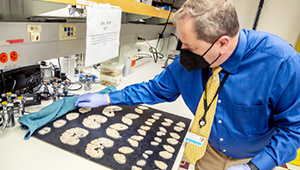Erin Bowles, MPH
Biography
Epidemiologist Erin Bowles, MPH, is looking at cancer screening and treatment from many different perspectives. Her research brings new insight into cancer risk factors, diagnosis, treatment, and survivorship, while helping improve cancer care for patients and families.
Erin received an R50 mid-career research award from the National Cancer Institute (NCI). This award is given to cancer researchers who have demonstrated successes and contributions to cancer research as a non-principal investigator. As a key member of 2 large cancer collaborations — the NCI's Breast Cancer Surveillance Consortium and the Health Care Systems Cancer Research Network (CRN) — Erin has developed diverse expertise that includes reading mammograms for breast density and using administrative data to understand patterns of care in cancer treatment.
Her current work includes:
- Collaborating on a multi-site CRN study led by an investigator at Memorial Sloan Kettering Cancer Center to understand how obesity affects chemotherapy treatment dosing and risks of recurrence and toxicity in women with breast cancer
- Helping investigators from Kaiser Permanente Northern California and the University of California (UC) San Francisco and UC Davis understand imaging trends in children and pregnant women, and subsequent risks of leukemia associated with ionizing radiation from imaging exams
- Working with investigators from the NCI, Kaiser Permanente Colorado, and Kaiser Permanente Georgia to study how mammographic breast density, radiation treatment, and tissue biomarkers are associated with second cancers in women with previous breast cancer
- Collaborating on several studies within the BCSC to understand how disparities and social determinants of health affect breast cancer screening, diagnosis, and surveillance
- Helping investigators from the University of Wisconsin develop a model to predict thyroid cancer diagnosis and evaluate how health care utilization affects thyroid cancer detection and outcomes
- Working with teams from the Centers for Disease Control and Prevention, University of Washington, and Multicare Health System to develop and validate questions about cancer screening for people eligible for breast, colorectal, cervical, and/or lung cancer screening for the National Health Interview Survey.
Erin’s experience working with large observational cohorts and collaborations with numerous study teams over the past 20 years has provided her with expertise in data collection and quality control for many subject areas. She is also a manager of the Collaborative Science Division at KPWHRI, providing leadership, supervision, mentorship, and support to junior faculty.
Research interests and experience
-
Cancer
Breast cancer; colorectal cancer; multiple myeloma; thyroid cancer; pancreatic cancer; biostatistics; epidemiology; mammography; mammographic breast density; cancer treatment; cancer screening and surveillance; automated data collection; quality of care; medication use; care coordination; administrative data
-
Health Services & Economics
Access to care; health disparities; health outcomes research; quality of life; measurement of change in health care systems; practice variation
-
Women's Health
Menopause; hormone replacement therapy (HRT); breast cancer
-
Aging & Geriatrics
Cognitive health and dementia; biostatistics; epidemiology; medication use; cancer
-
Medication Use & Patient Safety
Pharmacoepidemiology; observational study research methods; chemotherapy; radiation exposure
Recent publications
Horner K, Ludman E, McCorkle R, Canfield E, Flaherty L, Min J, Miyoshi J, Lapham B, Bowles EA, Wagner E. An oncology nurse navigator program designed to eliminate gaps in early cancer care. Clin J Oncol Nurs. 2013 Feb 1;17(1):43-8. PubMed
Gao H, Bowles EA, Carrell D, Biust D. Using natural language processing to extract findings from mammography reports. Clin Med Res. 2013;11(3):154
Ritzwoller DP, Carroll N, Delate T, Hornbrook MC, Kushi L, Aiello Bowles EJ, Freml JM, Huang K, Loggers ET. Patterns and predictors of first-line chemotherapy use among adults with advanced non-small cell lung cancer in the Cancer Research Network. Lung Cancer. 2012 Dec;78(3):245-52. doi: 10.1016/j.lungcan.2012.09.008. Epub 2012 Sep 27. PubMed
Aiello Bowles EJ, Boudreau DM, Chubak J, Yu O, Fujii M, Chestnut J, Buist DS. Patient reported discontinuation of endocrine therapy and related side effects among women with early stage breast cancer. J Oncol Prac. Nov 1 2012:e149-57. PubMed
Goddard KA, Aiello Bowles EJ, Spencer Feigelson H, Habel LA, Alford SH, McCarty CA, Nekhlyudov L, Onitilo AA, Rahm AK, Webster JA. Utilization of HER2 genetic treating in a multi-institutional observational study. Am J Manag Care. 2012 Nov;18(11):704-12. PubMed
Bowles EJ, Wellman R, Feigelson HS, Onitilo AA, Freedman AN, Delate T, Allen LA, Nekhlyudov L, Goddard KA, Davis RL, Habel LA, Yood MU, Magid D, Wagner EH, for the Pharmacovigilance Study Team. Risk of heart failure in breast cancer patients after anthracycline and trastuzumab treatment: a retrospective cohort study. J Natl Cancer Inst. 2012 Sep 5;104(17):1293-305. PubMed
Healthy Findings Blog

Meet KPWHRI’s collaborative scientists
The division contributes to research across the institute with methodological and subject matter expertise.
Breast Cancer Surveillance
Kaiser Permanente Washington Breast Cancer Surveillance Registry
Kaiser Permanente Washington has been part of the national Breast Cancer Surveillance Consortium since 1994. Learn about the Kaiser Permanente Washington Breast Cancer Surveillance Registry here.
Research

Improving cancer prevention and early detection
How KPWHRI is contributing to better cancer screening and better outcomes for patients.
News

New open data to help understand Alzheimer’s
Cell by cell, scientists are building a high-resolution map of brain changes in Alzheimer’s disease.
Research

Breast-biopsy delays after mammogram more likely for Black, Asian women
Study suggests disparities at screening sites may influence lag in follow-ups.



